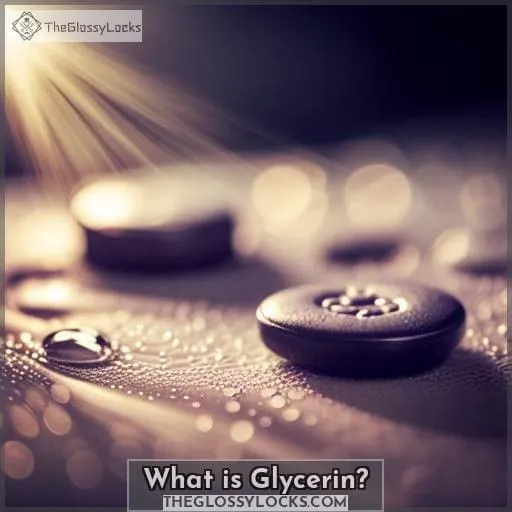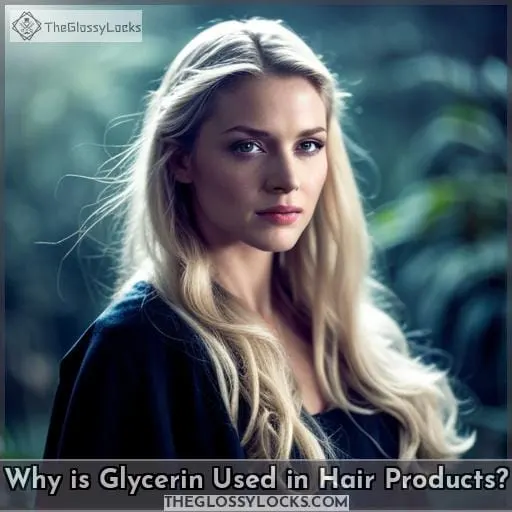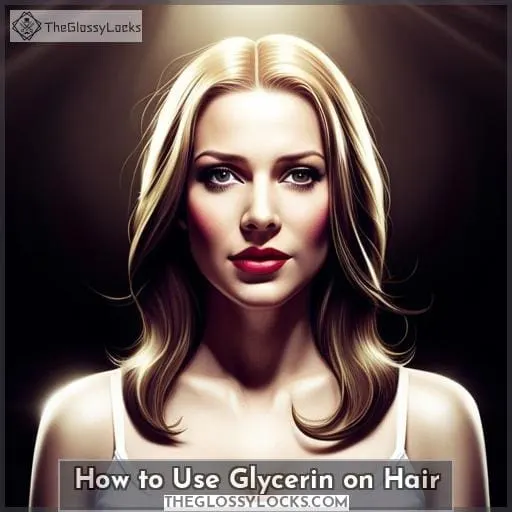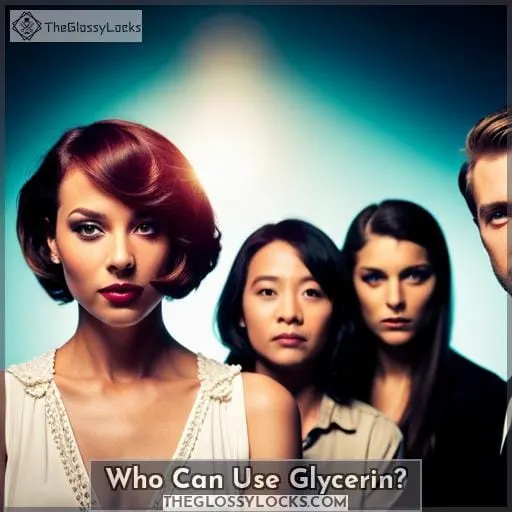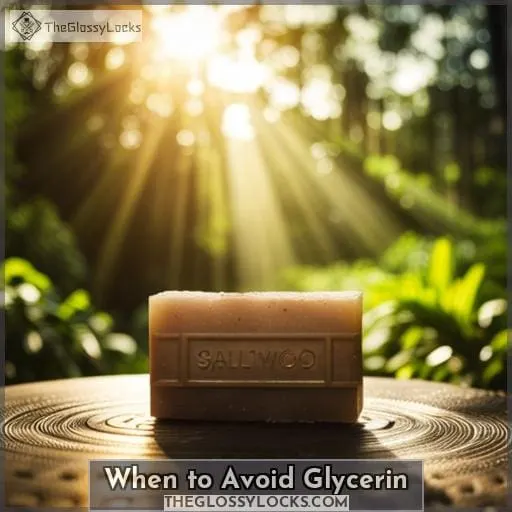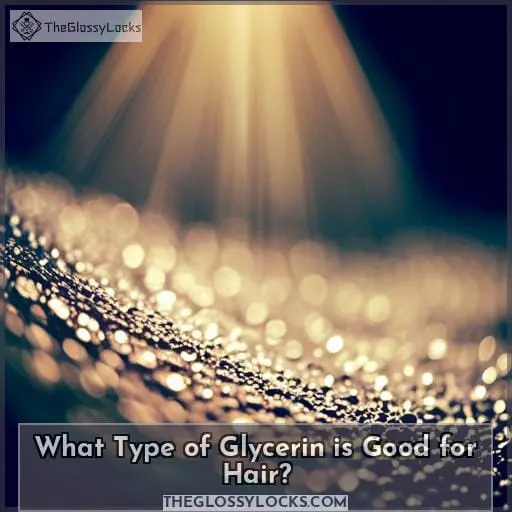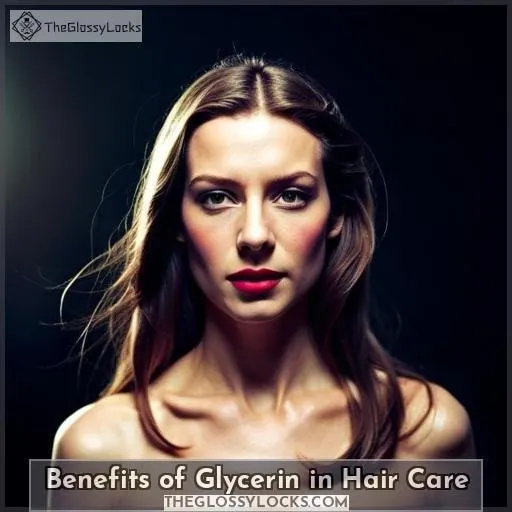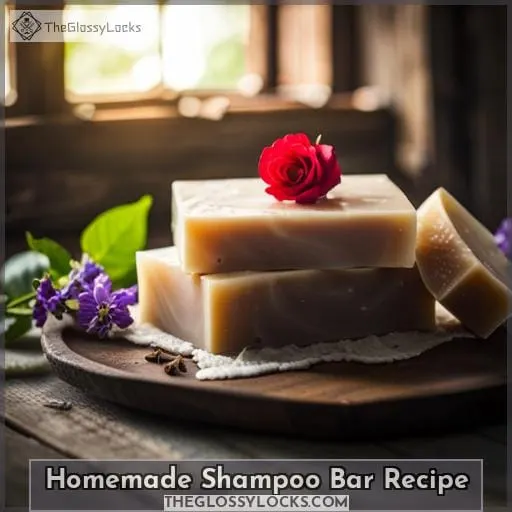This site is supported by our readers. We may earn a commission, at no cost to you, if you purchase through links.
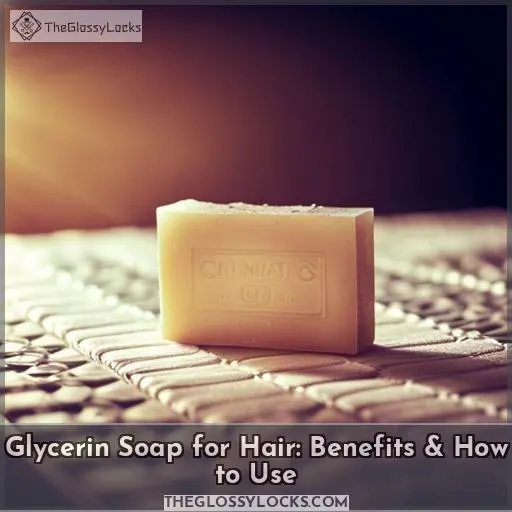 Are you looking for a natural, effective way to keep your hair strong and healthy? Glycerin soap may be the answer. A popular ingredient found in many beauty products, glycerin is an affordable humectant with numerous benefits for hair care.
Are you looking for a natural, effective way to keep your hair strong and healthy? Glycerin soap may be the answer. A popular ingredient found in many beauty products, glycerin is an affordable humectant with numerous benefits for hair care.
In this article, we’ll explore what makes glycerin ideal for use on your strands as well as how to incorporate it into your routine.
Table Of Contents
Key Takeaways
- Glycerin soap is suitable for sensitive skin types.
- Homemade shampoo bars with glycerin are nourishing for hair.
- Essential oils can be added to shampoo bars for fragrance and benefits.
- Natural glycerin is preferable for hair care.
What is Glycerin?
You might be wondering what the secret is to achieving healthy, nourished hair – and it could be glycerin! Glycerin is a humectant in cosmetics and hair products that provides deep moisturization and hydration.
It helps prevent split ends while promoting growth, repairing damage from styling or pollution, reducing scalp itching, and retaining moisture for softer locks.
Pure glycerin soap contains no alcohols or fragrances, making it ideal for sensitive skin types. Just do a patch test before full application to ensure there are no allergies present. Making your own homemade shampoo bar with natural ingredients like cocoa butter can further benefit your strands with added oils like olive oil or vitamin E oil, as well as essential oils of choice.
For maximum effectiveness in aiding the retention of moisture on dry days, try using diluted glycerin mixed with water rather than pure liquid form.
With proper care, utilizing this versatile ingredient often found in shampoos today, you can keep both your scalp happy all year round without having to worry about any adverse effects associated when compared against chemical-based alternatives available on drugstore shelves.
Why is Glycerin Used in Hair Products?
Gently moisturizing and gentle on the scalp, glycerin is an ideal addition to your haircare routine. It is used in many hair products because of its humectant properties, which draw moisture from the environment into hair and skin.
Long-term use of glycerin provides lasting benefits such as deep hydration for dry strands, repairing damage caused by styling or pollution, reducing split ends, and promoting growth.
Glycerin can also be used as a natural conditioner when mixed with water at a 1:5 ratio before application to dampened locks. It helps reduce frizziness while adding shine without leaving behind any residue or buildup on hair follicles.
In homemade recipes for conditioning masks, glycerin can be combined with oils like olive or coconut oil, along with herbs such as fenugreek, for added nourishment of both the scalp and strands.
Alternatively, you can create a spray using equal parts of water and alcohol, plus 2 teaspoons of liquid glycerin. Then, add your favorite essential oils to cater specifically to individual needs.
Always dilute pure liquid form prior to usage, however, since undiluted forms may cause irritation if applied directly onto the skin or scalp area – safety first!
How to Use Glycerin on Hair
Glycerin is an essential ingredient for hair care products, such as hair sprays, conditioners, and masks. It has anti-inflammatory and anti-irritant properties that make it ideal for use on sensitive skin and can help retain moisture in the scalp while preventing split ends to promote healthy growth.
Hair Spray
Spray your hair with a natural blend of essential oils and glycerin for extra nourishment. Avoid using products containing alcohol or sulfates, as they can strip away moisture. Humidity effects should be considered when styling – glycerin is ideal in damp climates while avoiding low humidity areas.
Create a DIY recipe by mixing vegan glycerin soap, shampoo, and conditioner with water to make your own unique hair spray! Hair masks made from herbs like fenugreek combined with lemon essential oil, castor oil, or honey also provide amazing benefits to the scalp and strands.
For an all-natural look free from chemicals, try creating custom sprays that will leave you feeling beautiful without sacrificing quality ingredients!
Hair Conditioner
Smooth a few drops of conditioning oil through your locks to nourish and protect them. Glycerin in hair conditioners adds hydration, repairs damage, prevents split ends, and relieves scalp itching. For DIY conditioners, use glycerin with water or other moisturizing ingredients like coconut milk or honey.
Essential oils like sandalwood promote growth, while lavender soothes the scalp. For best results, mix herbal rinses with apple cider vinegar for extra moisture-boosting effects.
Hair Mask
Mix up a luxurious hair mask using some of your favorite ingredients to give your locks an extra boost! Glycerin soap is ideal for deep hydration. Create DIY recipes with natural ingredients like olive oil, vitamin E oil, and essential oils for balanced moisture and healthy hair.
It’s perfect for those with dry, frizzy, or curly strands that need a little TLC.
Add glycerin to conditioners (1:5 ratio), shampoos, or homemade shampoo bars. It’s even great in sprays and serums! Keep experimenting until you find the right combination of nourishing elements that make your mane shine.
Healthy hair starts from within – let glycerin be part of the journey!
Who Can Use Glycerin?
Glycerin is suitable for all hair types, from dry and frizzy to curly, so you can reap its moisturizing and conditioning benefits. It’s important to consider the humidity in your area when using glycerin on your hair as it may not be effective in extremely low or high humidity levels.
Test for allergies with a patch test before applying glycerin products directly onto skin or scalp.
Glycerin combinations such as shampoos that contain other humectants like honey are great for deeper hydration of both scalp and strands.
- Suitable Hair Types: Dry, Frizzy & Curly
- Humidity Considerations: Low & High Levels
- Allergies Caution: Patch Test Prior To Use
Using natural ingredients like vegetable oils along with liquid glycerine makes an excellent soap bar alternative that helps retain moisture without stripping away essential oils from the body’s surface layers – perfect for those looking for a more skin friendly soap option! Additionally, adding small amounts of this ingredient into conditioners serves well towards achieving desired texture results while also improving manageability over time if used regularly.
However, make sure to dilute before use since concentrated forms can lead to excessive buildup on delicate strands.
With careful consideration given towards usage guidelines based off individual needs plus some experimentation along the way, glycerine just might become one’s best friend!
When to Avoid Glycerin
Though it’s great for skin and hair, you should avoid glycerin in very dry or low humidity climates. Humidity levels can affect how well the product works, as glycerin has water-absorbing properties that may deplete moisture from your hair.
This is especially true if using pure unadulterated forms of glycerin soap with no additional ingredients or conditioning agents like essential oils.
Furthermore, depending on weather conditions where you live, certain times of year might be more conducive to using a different type of shampoo such as one with moisturizing oils instead of pure glycerin soap.
Additionally, allergies and sensitivities must be taken into consideration when choosing products compatible with your skin type and climate conditions for optimal results in terms of hydration retention without causing any adverse reactions or drying out the scalp further than necessary due to lack humidity levels outside air cannot compensate for inside use!
| Weather Conditions | Glycerin Soap | Other Shampoo |
|---|---|---|
| Low Humidity | Avoid | Use |
How Much Glycerin Should You Use?
You can customize the amount of glycerin in your shampoo bar depending on how much moisture and hydration you need for your hair type. Glycerin helps to keep hair moisturized, but it is important to determine the right quantity for individual needs.
- Determine the desired level of hydration by assessing scalp health and texture.
- Start with a small dosage if unsure and add more as needed.
- Consider creating different ratios based on seasonality or climate changes, such as adding more during dry winter months.
Use no more than 5% in any given recipe. Too much glycerin may leave an undesirable residue or diminish lathering capabilities due to its water-absorbing properties.
Glycerin adds natural shine while providing gentle cleansing without stripping away essential oils from the scalp area. These oils help retain moisture balance and promote healthy growth cycles over time when used correctly at appropriate quantities.
It also acts as a natural conditioner when added directly into regular haircare routines like homemade DIY shampoos or store-bought formulas free of harsh chemicals, sulfates, parabens, etc.
As always, be sure to read ingredient labels carefully before purchasing products containing glycerin soap!
What Type of Glycerin is Good for Hair?
When it comes to hair care, glycerin is a popular choice due to its natural humectant properties. It can be found in both synthetic and natural forms, each with their own benefits and drawbacks for use on the hair.
Natural Glycerin
It’s important to choose natural glycerin when looking for a humectant for your hair care routine. Glycerin benefits include moisture retention, anti-inflammatory and anti-irritant properties, deep hydration, split end prevention, and repair of damage from styling or pollution.
For DIY haircare options, try adding glycerin in homemade recipes like shampoo bars or conditioners with water (1:5 ratio) along with oils like olive, coconut, or jojoba. Organic shampoos can also be made with essential oils such as lavender and rosemary, plus lemon oil and castor oil for added nourishment.
You’ll be able to enjoy the full range of benefits that come from using organic products on your hair – softness, shine, and scalp health without any irritation! To get the most out of this powerful ingredient, simply dilute it in water before use and apply evenly throughout damp hair.
| Benefits | Recipe Ideas | Application |
|---|---|---|
| Moisture Retention | Shampoo Bars | Dilution Required |
| Anti-Inflammatory Properties | Conditioner Mixture | |
| Split End Prevention | Oils e.g Olive/Coconut/Jojoba | |
| Damage Repair | Essential Oil Blends | |
| Softness + Shine | Aloe Vera + Honey Mask | |
| Scalp Health | Evenly Apply Throughout Damp Hair |
Synthetic Glycerin
Synthetic glycerin, while cheaper than natural sources, may contain additives that can be harmful to the hair.
- It doesn’t provide as much hydration and moisture balance as its natural counterpart.
- Manufacturers find it difficult to accurately measure the amount of synthetic glycerin needed for optimal results when creating cosmetics and other products containing it. This is due to inconsistencies with quality control standards among different suppliers of this type of ingredient.
- There are many myths surrounding the use of synthetic glycerins. These myths could lead people into believing that they will see better results using them over organic ones, which isn’t always true or reliable information.
- Synthetic ingredients often come from petrochemicals sourced from crude oil refining processes. As a result, there’s a greater chance that these substances won’t follow safety protocols such as biodegradability or sustainability standards put forth by environmental agencies.
Using homemade shampoo bars made with cocoa butter, vitamin E oil, and essential oils instead can help keep your locks nourished without any risk posed by artificial compounds like those found in some synthetically derived varieties on store shelves today!
Benefits of Glycerin in Hair Care
Benefitting from its anti-inflammatory and anti-irritant properties, glycerin can be a revitalizing addition to your hair care routine. It is a colorless, odorless liquid derived from various sources and is a humectant in cosmetics and hair products.
Deep moisturization and hydration are among the primary benefits of using this natural ingredient on your tresses. Glycerin helps prevent split ends by sealing moisture into the strands. It also promotes healthy scalp conditions with its anti-inflammatory abilities.
Hair masks that incorporate glycerin, along with herbs like fenugreek or essential oils such as lemon, can help repair damage caused by styling or pollution.
It is recommended to dilute glycerin in water before use to avoid any potential adverse reactions due to its sticky nature when used alone in dry climates.
Once you have achieved optimal results for yourself by experimenting with different ingredients, making homemade shampoo bars could also bring about some rejuvenating effects on your mane. This can be done without having harsh chemicals strip away those precious nutrients.
To give your hair an extra boost of nourishment, you can try an apple cider vinegar rinse afterwards.
Homemade Shampoo Bar Recipe
Try your hand at making a homemade shampoo bar with this easy recipe!
With customization options for different hair types, ingredients like melt and pour soap base, cocoa butter, olive oil, vitamin E oil, and essential oils make for the perfect combination.
Hair bars are moisturizing without leaving behind any sticky residue. Glycerin is naturally present in these soaps to help retain moisture while preventing split ends from forming. Essential oils provide an invigorating scent as well as additional benefits to nourish hair follicles and scalp health.
Use the shampoo bar directly or dilute it before applying on wet hair – working up a lather, of course!
The shelf life of homemade bars can be up to one year when stored properly in airtight containers; rosemary essential oil also acts as a preservative here.
For added conditioning properties, use an apple cider vinegar rinse afterwards too!
With all its natural goodness, you’ll wonder what took you so long before trying out this awesome DIY project – go ahead, give it a shot today!
Conclusion
Glycerin soap is an ideal choice for those looking to use a natural product on their hair. It is a humectant that helps retain moisture and can be used in various ways. Glycerin is beneficial for all hair types, but it is particularly useful for those with dry, frizzy, or curly hair.
It promotes hair growth, reduces scalp itching, and repairs damage from styling and pollution.
For those interested in making their own shampoo bar from scratch, there are many recipes available. Glycerin is a colorless and odorless liquid found in a variety of sources. With its numerous benefits, it is no surprise that glycerin is a popular choice for those looking to naturally care for their hair.

